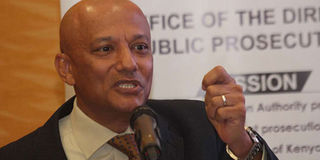Expedite big cases to win war on graft

Ethics and Anti-Corruption Commission CEO Twalib Mbarak. He must soldier on despite the challenges. PHOTO | FILE | NATION MEDIA GROUP
What you need to know:
- Before the administration of President Kenyatta ends, more heads should roll, as this has already been demonstrated.
- Kenyans expect the Judiciary to rise to the occasion and determine cases before it without bending to the whims of moneyed lawyers and their rich clients.
The fight against corruption has rekindled hope among Kenyans.
This is a war Kenyans have yearned for since their country became a republic. Granted, there have been many attempts to fight corruption.
Mzee Jomo Kenyatta always insisted that Kenya was a free country but if any of his friends was caught with his hands in the till, the old man would not come to his rescue.
The late Daniel arap Moi made attempts to fight corruption in the twilight of his administration by creating the anti-corruption commission. Nothing much came out of it.
The Narc administration of President Mwai Kibaki made serious attempts to fight corruption. They started with the radical surgery of judiciary that saw several judges sent home.
RULE OF LAW
This was also followed by the setting-up of the anti-corruption agency. But due to the prevailing political interests, the agency did not achieve much.
It was not until the second term of President Uhuru Kenyatta that Kenyans now appreciate that something is indeed being done to slay the dragon.
A Cabinet secretary, principal secretaries, governors, parastatals chiefs and all manner of senior government officials have been hurled in court with corruption-related cases.
The Directorate of Criminal Investigations and the Ethics and Anti-Corruption Commission have done their bit in investigating and recommending the prosecution of various top men and women in government.
The Director of Public Prosecutions has been forthcoming in studying the files before him in record time and giving directions either to prosecute or calling for more investigations.
BUDGET CUT
While the investigators and the prosecution must provide a water-tight case, the judiciary must also hear and determine cases expeditiously.
Unfortunately, we are entering the third year of accelerated fight on corruption but the cases still take too long to decide.
The chicken and snake thieves are still being taken to the cooler faster and with stiffer sentences than the top executives who use all manner of tricks to delay their cases.
It is sad that these shenanigans go on with the tacit approval of the judges and magistrates. The country bleeds billions of shillings owing to corruption.
Stern and unequivocal action on the part of the judiciary is needed, to send out the message that corruption does not pay. But, unfortunately, this has not happened.
That the Judiciary has cried out that their budget has been cut is not an excuse not to deliver.
The fight against corruption has been steady since 2018 and it’s only a few weeks back that the judiciary said their budget has not been increased as per their expectations. In short, the budget was ample in previous years but with no corresponding results.
It’s instructive to note that members of the County Assembly of Kiambu, probably aware that the case facing their governor would take inordinately long to complete, decided to take the bull by the horns and impeach him, a decision that was okayed by the Senate.
WEAK LINK
Parastatals and ministries may not have this tool, but we hope the investigating agencies and the prosecution will soldier on despite the weak link that is the Judiciary.
Before the administration of President Kenyatta ends, more heads should roll, as this has already been demonstrated.
The president has infused the much-needed political goodwill in the fight against corruption.
Kenyans expect the Judiciary to rise to the occasion and determine cases before it without bending to the whims of moneyed lawyers and their rich clients.
That charged officers remain suspended and on half a pay is a win for Wanjiku, but this should not be a permanent status.
They say a chain is as strong as the weakest link. A weak chain will only lead to erosion of public trust.
The writer is a governance expert; [email protected]




